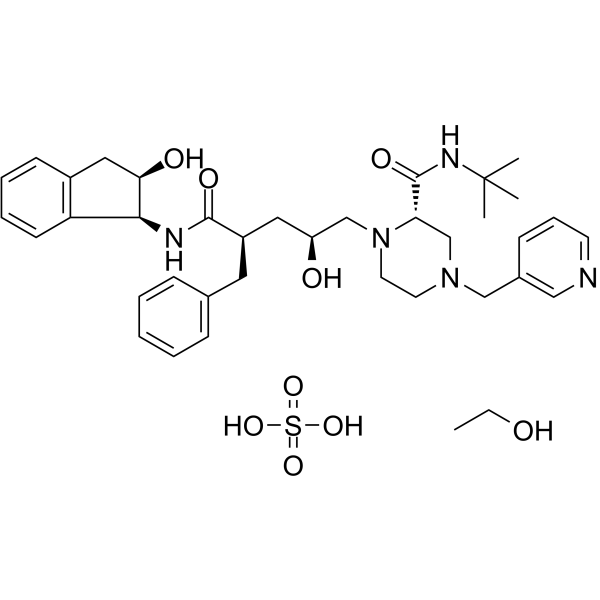2563866-80-6
| Name | Indinavir sulfate ethanolate |
|---|
| Description | Indinavir sulfate ethanolate (MK-639 ethanolate) is an orally active and selective HIV-1 protease inhibitor with a Ki of 0.54 nM for PR. Indinavir sulfate ethanolate exhibits anticancer activity by inhibiting the activation of MMPs-2 hydrolysis, anti-angiogenesis and inducing apoptosis. Indinavir sulfate ethanolate is also a SARS-CoV 3CLpro inhibitor[1][2][3][4]. |
|---|---|
| Related Catalog | |
| Target |
HIV-1 MMP-2 |
| In Vitro | Indinavir sulfate ethanolate (0-50 µM; 18 h) blocks lymphocyte cell cycle in G0/G1 phase in PBMCs cells and impairs lymphoproliferative responses[1]. Indinavir sulfate ethanolate (40 µM-40 nM; 5 days) inhibits cell invasion and (40 µM-40 nM; 48 h) MMPs-2 activation of the Huh7 and SK-HEP-1 hepatocarcinoma cells in vitro[2]. Cell Viability Assay[1] Cell Line: PBMCs (from healthy and HIV-infected volunteers) Concentration: 0-50 µM Incubation Time: 18 h (pretreatment; stimulation with anti-CD3 for an additional 48 hours) Result: Blocked anti-CD3-induced cell-cycle progression in a dose-dependent manner. Resulted in dose-dependent reduction of lymphoproliferative responses. Cell Invasion Assay[2] Cell Line: Huh7 and SK-HEP-1 cells Concentration: 40 µM-40 nM Incubation Time: 5 days Result: Reduced ability to invade an in vitro constituted extracellular matrix for both cell lines treated compared with the untreated cells. Western Blot Analysis[2] Cell Line: Huh7 and SK-HEP-1 cells Concentration: 40 µM-40 nM Incubation Time: 48 h Result: Blocked the conversion of latent MMP-2 to its 62/64-kDa active form. |
| In Vivo | Indinavir sulfate ethanolate (70 mg/kg; i.g.; once a day for 3 weeks) inhibits the growth of hepatocarcinoma cells in vivo[2]. Animal Model: Nude mice(s.c. into Huh7 and SK-HEP-1 cells)[2]. Dosage: 70 mg/kg Administration: Oral gavage; once a day for 3 weeks Result: Delaied the growth of s.c. implanted hepatocarcinoma xenografts in nude mice compared with placebo. |
| References |
| Molecular Formula | C38H55N5O9S |
|---|---|
| Molecular Weight | 757.94 |
